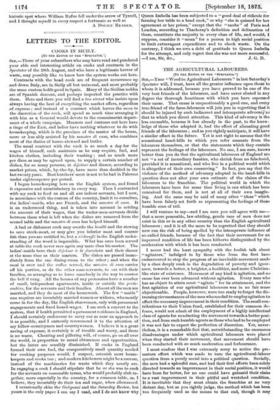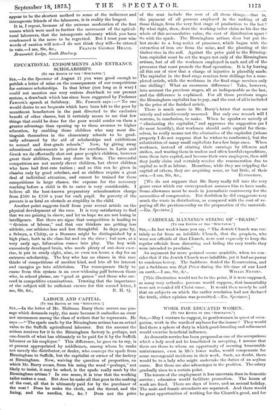THE AGRICULTURAL LABOURERS.
(TO THE EDITOR OF THE "SPECTATOR.") Sin,—Your "Word to Agricultural Labourers" in last Saturday's Spectator will, I trust, have all the greater influence upon those to whom it is addressed, because you have proved to be one of the very best friends of the labourers, and have never abated in any degree the thorough heartiness with which you have espoused their cause. That cause is unquestionably a good one, and every true friend of the farm-labourers will join you in regretting that it should be injured by such indiscreet and intemperate advocady^as that to which you direct attention. This kind of advocacy is the less excusable, because it has already in the past, to the know- ledge of those who adopted it, had the effect of alienating good friends of the labourers ; and as you rightly anticipate, it will have a similar effect in the future. Yet is not right to assume that the sensational hand-bills to which you refer emanate from the labourers themselves, or that the statements which they contain represent the feelings of the labourers. No one, I am sure, knolvs better than you do that the agricultural labourers of England are not "a set of incendiary fanatics, who shrink from no falsehood, provided it is sensational, and who live in a political world which is altogether of their own conserving." In fact, you say that the violence of the method of advocacy adopted in the hand-bills in question does not alter your own estimate of the claims of the labourers to the franchise. 'The political world in which the labourers have been for some time living is one which has been conceived for them, and is not at all of their own imagin- ing. And the same may be said of many other " ideas " which have been falsely set forth as representing the feelings of those humble sons of toil.
I will venture to say—and I am sure you will agree with me— that a more peaceable, law-abiding, gentle race of men does not exist in this or in any other country than the English agricultural labourers ; and it is all the more to be regretted that they should now run the risk of being spoiled by the intemperate influence of so-called friends, because of the fact that their movement for an improved condition of life has been hitherto distinguished by the moderation with which it has been conducted.
I never had the least sympathy with the foolish talk about "agitators," indulged in by those who from the first have endeavoured to stop the progress of an inevitable movement made by a class deeply sunk in the degradation of poverty and ignor- ance, towards a better, a brighter, a healthier, and more Christian- like state of existence. Movement of any kind is agitation, and no cause has ever been advanced without agitation. Every man who has an object to attain must 6' agitate" for its attainment, and the first agitation of our agricultural labourers was in no fair sense objectionable. People, however, were too ready to forget the dis- tressing circumstances of the men who needed to employagitation to effect the necessary improvement in their condition. The small con- tributions to their Union fund, established for their common de- fence, would not admit of the employment of a highly intellectual class of agents for conducting the movement towards a better posi- tion, and from such humble agents as those who had to be employed it was not fair to expect the perfection of discretion. Yet, never- theless, it is a remarkable fact that, notwithstanding the enormous disadvantages under which agricultural labourers were placed when they started their movement, that movement should have been conducted with so much moderation and forbearance.
I must confess that I was extremely sorry to notice the pre- mature effort which was made to turn the agricultural-labour question from a purely social into a political question. Socially, the men had a splendid case, and had their first efforts been solely directed towards an improvement in their social position, it would have been far better, for no one could have gainsaid their claim to a vast improvement in their pitiful and wretched condition. It is inevitable that they must obtain the franchise at no very distant day, but as you rightly judge, the method which has been too frequently used as the means to that end, though it may appear to be the shortest method to some of the indiscreet and intemperate friends of the labourers, is in reality the longest. It is, I repeat, because of the extreme moderation of the first means which were used to further the movement of the agricul- tural labourers, that the intemperate advocacy which you have condemned is the more to be regretted. But I trust your wise words of caution will not—I do not think they will—be uttered
in vain.—' am, Sir, &c., FRANCIS GEORGE HEATH. Brunswick Lodge, South Hackney.































 Previous page
Previous page